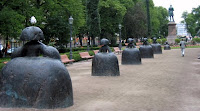RES IPSA LOQUITUR

I’m back in Helsinki. I’m attending the ISSEI conference on Language and the Scientific Imagination. As often, I let myself be inspired by people and talks. But I have quotes on my mind. I see them everywhere. And every time someone quotes a text in a panel, I can’t seem to get past it. My mind wanders off with another quote, which I conjure up in my head and which I imagine I offer in response to the one delivered. I imagine that I elope with my quote. Escape talking things to death. Escape knowing too many things – or is it too few? A motto on the invitation to the National District Attorneys’ Convention in Las Vegas, held between April 25-29, 1971, comes to my mind: “If you don’t know, come to learn… If you know, come to teach”. I’m thinking of middle positions between learning and knowing, between coming and going, between toing and froing. A quote is delivered by a friend: “Those who can't talk, and those who can talk but don't, have the great advantage over the rest of us in that they never say anything stupid. This may be why we are convinced that if they spoke they would have something wise to say.” It occurs to me that science fiction writer Ursula Le Guin is the best philosopher on the concept of non-decision in her book Changing Planes, where these lines are quoted from. Airports of perception. I decide that I don’t want to escape talking, but that I do want to escape knowing – that there might be less or more to love and life and the stuff in between. “That love is all there is, is all we know of love,” Emily Dickinson intimates, also pointing to the fact that the pointless is the point: knowing so little after so much anguish is hardly worth the while. But we often decide not to decide that half way towards knowing we already know that resisting knowing is not a cure for curiosity. “May you live in interesting times,” a Chinese proverb says, and it is not meant as a good omen. At its core there is an implicit valorization of being boring. Asking questions à la Eliot’s Prufrock: “and how should I presume?" Between interesting time and boring time we non-decide to not talk about it.
I go to the library. Bad idea. I stumble over Wendy Cope. Her poetry is all about coping. I pick up her new collection of selected poems Two Cures for Love and even though the book was not part of the Finnish final summer sale, I buy it instantly. I see that my quotes have also been messing with Cope. Eliot’s The Waste Land has been turned into a set of parodic verses. Limericks, to be more precise. The last three verses run like this:
III
The Thames runs, bones rattle, rats creep;
Tiresias fancies a peep –
A typist is laid,
A record is played –
Wei la la. After this it gets deep.
IV
A Phoenician called Phlebas forgot
About birds and his business – the lot,
which is no surprise,
Since he’d met his demise
And been left in the ocean to rot.
V
No water. Dry rocks and dry throats,
Then thunder, a shower of quotes
From the Sanskrit and Dante,
Da. Damyata. Shantih.
I hope you’ll make sense of the notes.”
Res ipsa loquitur. The thing itself speaks. But what is the thing itself?
Wendy’s title poem, Two Cures for Love, has only two lines in it in spite of its obvious significance – but who needs to count, when symmetry gives itself to itself?
“1. Don’t see him. Don’t phone or write a letter."
"2. The easy way: get to know him better.”
Wendy’s book is all about teaching knowing. I wish though that she would say something about the vehicle for illumination. “It's darkest underneath the lampstand,” a Korean proverb says. Watching the half naked Finns promenading down the main esplanda in Helsinki, I have the feeling that they have learned that lesson. How do I know it for sure? I asked.


Comments